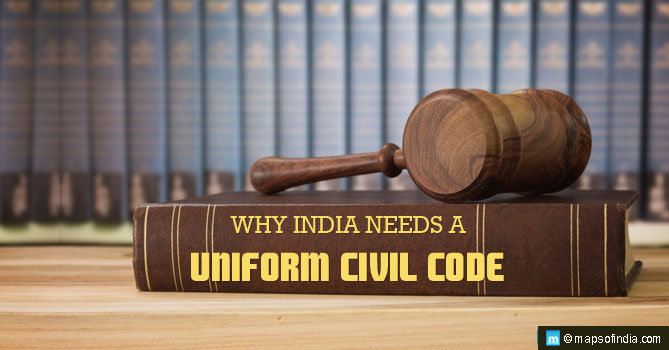Context-
The Uttarakhand Assembly is likely to pass the State’s Uniform Civil Code (UCC) Bill during its four-day-long session this week. A State-appointed panel constituted to draft the UCC submitted its final report to Chief Minister Pushkar Singh Dhami on February 2. The report has also been passed by the State Cabinet.
What is the Uniform Civil Code (UCC)?
The UCC is a proposition to replace the personal laws, which are based on the scriptures and customs of different religious communities in India, with a common set of laws governing every citizen
Background:
The deliberations of the Constituent Assembly of India were marked by significant debate surrounding the Uniform Civil Code (UCC). Article 44 of the Constitution, enshrined within the Directive Principles of State Policy, advocates for the implementation of a UCC across India. This provision sparked discussions on whether the UCC should be elevated to the status of a fundamental right or remain a directive principle. Opponents voiced concerns about potential encroachment upon religious minority rights and cultural diversity, citing the potential conflict with Article 25, which guarantees freedom of religion. Conversely, proponents, including figures like K.M. Munshi, championed the UCC for its potential to advance gender equality and foster social reform. Ultimately, the Constituent Assembly decided against granting fundamental rights status to the UCC, affirming its recommendatory nature.
State Government Initiatives towards a UCC
The question of whether state governments possess the authority to implement a State-wide UCC has come under scrutiny. In Uttarakhand, the government has taken steps towards introducing its own UCC, aligning with electoral promises. A State-appointed panel, led by Justice Ranjana Prakash Desai, submitted its report to Chief Minister Pushkar Singh Dhami, indicating the state's commitment to pursuing a UCC. However, this move has faced opposition, particularly from rival political factions and certain communities within Uttarakhand. Concerns have been raised regarding potential marginalization and the lack of consent from affected groups.
What are the issues of adopting the UCC in Uttarakhand?
- Concerns from Tribal Communities: Tribal groups, making up 2.9% of Uttarakhand’s population, have not agreed to the UCC. The Van Gujjar tribe, particularly, is worried about the impact on their customs.
- Impact on Religious Freedom: Critics fear the UCC could infringe upon religious freedoms and minority rights.
- Threat to Cultural Diversity: There are concerns that UCC might dilute India’s rich religious and cultural diversity.
- National Debate and Precedence: The state’s approach may set a precedent for other Indian states.
What are the different views on implementing the UCC nationwide?
- Supreme Court's Position on UCC ImplementationThe Supreme Court of India has played a pivotal role in shaping the discourse surrounding the UCC. While landmark cases such as Shah Bano Begum, Sarla Mudgal versus Union of India, and John Vallamattom versus Union of India have underscored the necessity of implementing a UCC, the Court has refrained from issuing directives to the government. It maintains that the enactment of a UCC falls within the legislative purview of Parliament. The Court's dismissal of petitions advocating for uniformity in divorce laws underscores its stance on the matter. Moreover, the Court's interpretation of Article 162 of the Constitution, which grants states the authority to legislate on personal laws, has implications for the autonomy of state governments in pursuing UCC initiatives.
- Law Commission's Recommendations and Public ConsultationsThe Law Commission of India has contributed valuable insights into the formulation of a UCC. While the 21st Law Commission, chaired by Justice Balbir Singh Chauhan, suggested that a UCC might not be necessary or desirable at the present stage, it emphasized the need for reforms within existing personal laws to address discriminatory practices. However, the 22nd Law Commission, led by Justice Rituraj Awasthi, initiated consultations to gather opinions from various stakeholders, signaling a renewed interest in the UCC debate. The commission's engagement with public and religious organizations reflects the complexity and diversity of perspectives surrounding the UCC issue.
Future Prospects and Challenges of Implementing a UCC
The pursuit of a UCC by certain states, including Uttarakhand, Madhya Pradesh, and Gujarat, underscores the growing momentum behind the initiative. However, challenges persist, particularly concerning community consent, political polarization, and legal complexities. The Supreme Court's reluctance to intervene directly in UCC matters underscores the primacy of legislative action in enacting comprehensive civil code reforms. The pending query before the Supreme Court regarding the right to freedom of religion further complicates the UCC debate, necessitating broader constitutional interpretation and deliberation.
Conclusion
In conclusion, the quest for a Uniform Civil Code reflects India's ongoing journey towards social and legal reform, balancing imperatives of gender equality, cultural diversity, and constitutional principles. While the road ahead may be fraught with challenges and divergent viewpoints, the pursuit of a UCC remains a pivotal aspect of India's evolving legal landscape, shaping the contours of citizenship, identity, and governance in the 21st century. Through a nuanced understanding of historical debates, contemporary initiatives, and legal considerations, India can navigate towards a more equitable and just legal framework that resonates with its pluralistic ethos and democratic ideals.
|
Probable Questions for UPSC Mains Exam-
|
Source - The Hindu







